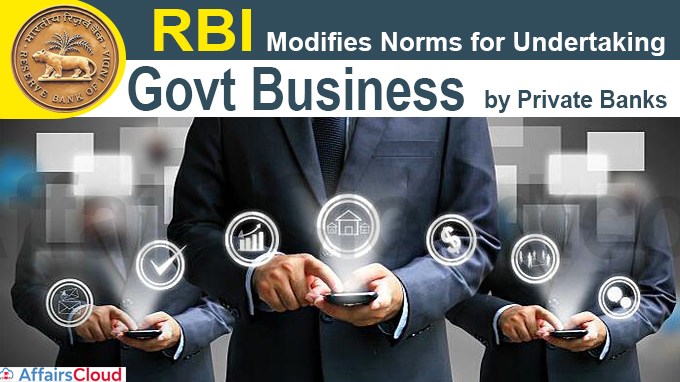 On May 10, 2021, The Reserve Bank of India (RBI), revised the existing guidelines on “Appointment of Scheduled Private Sector Banks as Agency Banks of RBI” for authorising Scheduled Private Sector Banks as agency banks of RBI for conducting government business (Central and/or State).
On May 10, 2021, The Reserve Bank of India (RBI), revised the existing guidelines on “Appointment of Scheduled Private Sector Banks as Agency Banks of RBI” for authorising Scheduled Private Sector Banks as agency banks of RBI for conducting government business (Central and/or State).
Note – In February 2021, the Finance Ministry had removed the embargo (an official ban) imposed in September 2012 on the allocation of government business to private sector banks.
About the revised guidelines:
i.For existing Private Sector Agency Banks:
- The Private Sector Agency Banks which already have agency banking agreements with RBI were authorized to continue the government agency business for Central and/or State Governments without taking any fresh approval from RBI.
- Note – If need to undertake fresh/additional government agency business, they have to obtain approval from – O/o (Office of) Controller General of Accounts (CGA) (for Central Government) or the Finance Department of the State Government (for State Government) and Department of Government and Bank Accounts, Central Office, Mumbai (DGBA, CO).
ii.For Private Sector Banks that without Agency Banking agreement with RBI:
- If the Scheduled private sector banks (which is not having agency agreement with RBI) wish to undertake government business, it will be approved by RBI only if it is not under the Prompt Corrective Action (PCA) framework of the RBI.
Eligible transactions undertaken Agency Banks:
Transactions relating to government business undertaken by agency banks that are revenue receipts and payments on behalf of the Central/State Government; pension payments in respect of Central / State Governments; Special Deposit Scheme (SDS) 1975.
- Other transactions that are eligible for agency commission are: Public Provident Fund (PPF) Scheme, 1968; Senior Citizen Savings Scheme (SCSS), 2004; Kisan Vikas Patra (KVP), 2014 and Sukanya Samriddhi Account (SSA).
About the Approval:
Once RBI authorises a bank for any Government business, the approval regarding the mode (physical or e-mode) and area of operations will be decided by the O/o CGA or the Finance Department of the State Government (keeping RBI informed).
Note – Central Government Departments /State Governments have the option to accredit an agency bank and discontinue the bank from agency business.
-RBI Amended the Master Direction on KYC
RBI Amended the Master Direction on know your customer(KYC) to further leverage the Video-based Customer Identification Process (V-CIP) and simplify the process of periodic updating of KYC.
About the Amendments in Brief:
Amended Definition of V-CIP (Clause (xx) of Section 3):
V-CIP is an alternate method of customer identification with facial recognition and customer due diligence by an authorised official of the regulated entity (RE) by undertaking seamless, secure, live, informed-consent based audio-visual interaction with the customer to obtain identification information required for Customer Due Diligence (CDD) purpose.
Note – RBI regulated entities (REs), include banks, Non-Banking Finance Companies(NBFCs), and payment system operators.
Amendment over the Clause (v) of Section 17:
Both the deposit and borrower accounts that are opened using OTP based e-KYC, will not be allowed for more than 1 year without identification.
Amendment over Section 18 on V-CIP:
Under this, REs are allowed to undertake V-CIP for the following conditions:
i.To carry out CDD for,
- Individual customers – in case of new customer onboarding
- Proprietor – in case of proprietorship firm
- Authorised signatories and Beneficial Owners (BOs)- in case of Legal Entity (LE) customers.
ii.For converting existing accounts opened in non-face to face mode using Aadhaar OTP based e-KYC authentication.
iii.For Updation/Periodic updation of KYC for eligible customers.
RBI has specified certain standards for REs which are opting to undertake V-CIP:
i.V-CIP Infrastructure:
- REs should comply with the – RBI guidelines on minimum baseline cybersecurity and resilience framework for banks.
- The V-CIP connection and interaction should originate from its own secured network domain and the technology infrastructure should be housed in the own premises of the RE.
- The V-CIP infrastructure/application should able to prevent the connection from IP addresses outside India or from spoofed IP addresses.
- End-to-end encryption of data between the customer device and the hosting point of the V-CIP application should be ensured.
ii.V-CIP Procedure:
While performing the V-CIP the RE official should record audio-video and capture photographs of the customer for identification
The identification information could be obtained using any one of the following:
- OTP based Aadhaar e-KYC authentication
- Offline Verification of Aadhaar
- KYC records downloaded from CKYCR
- Equivalent e-document of Officially Valid Documents (OVDs) including documents issued through DigiLocker
Recent Related News:
On April 26, 2021, the Reserve Bank of India (RBI) through its circular – “Corporate Governance in Banks – Appointment of Directors and Constitution of Committees of the Board”, has fixed 15 years as the tenure for the Managing Director and Chief executive officers (MD & CEOs) or whole-time directors(WTDs) to hold their post in a bank.
In April 2021, Based on the empirical testing and review of Counter-Cyclical Capital Buffer (CCyB) indicators by The Reserve Bank of India (RBI), it has decided not to activate CCyB at present as there is no necessity for it.
About Reserve Bank of India(RBI):
Establishment – 1st April 1935
Headquarters – Mumbai, Maharashtra
Governor – Shaktikanta Das
Deputy Governors – Mahesh Kumar Jain, Michael DebabrataPatra, M Rajeshwar Rao, and T Rabi Sankar (appointed on May 2021)




